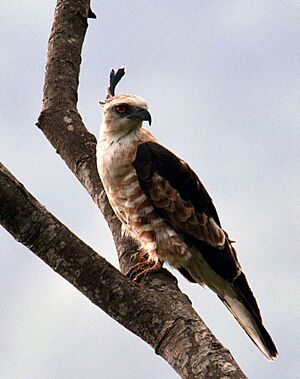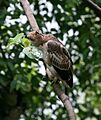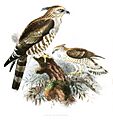Jerdon's baza facts for kids
Quick facts for kids Jerdon's baza |
|
|---|---|
 |
|
| Conservation status | |
| Scientific classification |
|
| Kingdom: | Animalia |
| Phylum: | Chordata |
| Class: | Aves |
| Order: | Accipitriformes |
| Family: | Accipitridae |
| Genus: | Aviceda |
| Species: |
A. jerdoni
|
| Binomial name | |
| Aviceda jerdoni (Blyth, 1842)
|
|
| Script error: The function "autoWithCaption" does not exist. | |
Script error: No such module "Check for conflicting parameters".
The Jerdon's baza (Aviceda jerdoni) is a cool bird of prey. It's a medium-sized hawk, mostly brown. It has a special black crest on its head that usually stands up. This crest often has a white tip. You can find this bird in parts of South-east Asia. It likes to live in the foothills, especially in grassy areas called the terai. It is less common in thick evergreen forests or tea farms.
This bird's common name and its scientific name, jerdoni, honor a surgeon and naturalist named Thomas C. Jerdon.
Contents
What Does Jerdon's Baza Look Like?
This hawk is about 46 centimeters (about 18 inches) long. When it flies, it might look a bit like a crested goshawk or a changeable hawk-eagle. But you can tell it apart by a few things. It has a longer crest that stands straight up. Its wings are very wide and rounded, almost like paddles. Also, its belly and chest are mostly plain and light-colored. It has a white chin and a clear black stripe down the middle of its face.
Different Types of Jerdon's Baza
Scientists have found several different types, or subspecies, of Jerdon's baza across its wide home range. These different types have slight differences in their looks or where they live. Some of them include:
- A. j. jerdoni (Blyth, 1842) – Found from Sikkim to Assam, Burma, and Sumatra.
- A. j. ceylonensis (Legge, 1876) – Lives in South India and Sri Lanka.
- A. j. borneensis (Sharpe, 1893) – Found on the island of Borneo.
- A. j. magnirostris (Kaup, 1847) – Lives in the Philippines, on islands like Luzon and Mindanao.
- A. j. leucopias (Sharpe, 1888) – Found on Philippine islands like Romblon, Samar, and Palawan.
- A. j. celebensis (Schlegel, 1873) – Lives on the island of Sulawesi (formerly Celebes).
Where Does Jerdon's Baza Live?
Jerdon's baza lives in many places across Asia. It is a resident bird, meaning it stays in these areas all year round. You can find it in the terai region of North India and the foothills of the Eastern Himalayas. This includes areas from Eastern Nepal and the Bengal duars (floodplains) to the Assam valley. It also lives in the Western Ghats in Southern India, southern Sri Lanka, Bangladesh, Burma, Thailand, Sumatra, Singapore, and the Philippines.
How Jerdon's Baza Behaves
You will often see Jerdon's baza flying in pairs. They often make quick flights into the air to catch prey. When they do this, their crest is usually standing up. Sometimes, you might even spot small family groups of 3 to 5 birds flying near the edge of forests.
These birds also perform special "soaring and undulating" flights. This means they fly high in circles and then dip up and down. They do this especially near their nests.
What Jerdon's Baza Eats
Jerdon's baza eats lizards, grasshoppers, and other large insects. For example, one bird's stomach was found to contain an agamid lizard, a type of lizard called Japalura variegata, several longhorn beetles, and mantises.
Breeding Season
The time when Jerdon's baza breeds can be different depending on the local area. However, these birds are known to breed almost all year long. They usually take a break for only a few months around April and May.
Gallery
 | Georgia Louise Harris Brown |
 | Julian Abele |
 | Norma Merrick Sklarek |
 | William Sidney Pittman |






